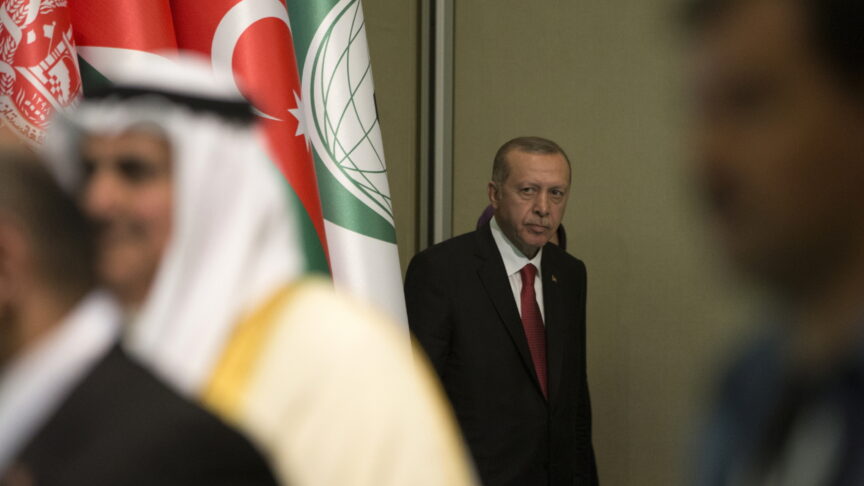EU warns Central Asia of ‘negative effects’ of appeasing Turkey with North Cyprus
An official from the EU’s diplomatic service warned on Wednesday (20 September) that Central Asian countries would face “negative effects” if they ratify the accession of North Cyprus as an observer to the Organisation of Turkic States (OTS).
The message came loud and clear during the conference “Uzbekistan – The EU’s strategic partner in Central Asia”, organised by the Centre of European Neighbourhood Council (ENC), a Brussels think-tank. The event was hosted by MEP Ilhan Kyuchyuk, European Parliament rapporteur for Uzbekistan.
Dietmar Krissler, head of the division for Central Asia in the European External Action Service, said that Central Asian countries would face “negative effects” if they support the OTS decision to admit “the illegal entity of Northern Cyprus” as an observer to OTS, an intergovernmental organisation.
“For my region [the EU], the prospects for developing cooperation with [the countries of Central Asia] would very much depend on their future position, whether or not Northern Cyprus will effectively become an observer of the OTS,” he said.
He made the comments in reaction to Amanda Paul from the European Policy Centre, who advised the EU to cooperate closely in the Central Asian region with Turkey.
“We have to be very careful with our selection with whom we team up,” Krissler said, adding that Turkey had “its own agenda” in the region.
The decision to grant observer status to the so-called North Cyprus Turkish Republic was taken unanimously at an OTS Summit in the Uzbek city of Samarkand on 11 November 2022. Turkish President Recep Tayyip Erdoğan has recently redoubled his calls for the international recognition of Northern Cyprus.
The members of OTS are Azerbaijan, Kazakhstan, Kyrgyzstan, Turkey and Uzbekistan. Observer states are Turkmenistan, North Cyprus, and EU member Hungary.
Even though the Hungarian language is Finno-Ugric and does not belong to the Turkic family, Hungary has had observer status in OTS since 2018 and reportedly wants to join as a full member.
The EU diplomat said that the OTS decision to upgrade the status of the Northern Republic of Cyprus through OTS was “a particular political issue susceptible to one of our member states”, namely the Republic of Cyprus.
Cyprus has been divided since 1974, when the Turkish army invaded the northern third of the island in response to a coup that had sought to unite the entire island with Greece.
Officially, the entire territory of Cyprus is EU territory since the Republic of Cyprus joined the union in 2004.
Krissler explained that the decision to grant observer status had to be ratified by the national parliaments of Kazakhstan, Kyrgyzstan and Uzbekistan to become effective.
He further hinted that the EU response, in case of ignoring the EU concern, could be the failure of the EU to ratify Enhanced Partnership and Cooperation (EPC) agreements with Central Asian countries.
The failure of only one member to ratify can indeed block the whole ratification.
The EPC with Kazakhstan is already in force, but this is not yet the case with Kyrgyzstan and Uzbekistan.
Euractiv asked if the EEAS was comfortable with having an EU member, Hungary, on board with OTS while this organisation takes decisions harmful to another EU member, Cyprus.
Krissler said that as an observer member, Hungary was not part of the OTS decision-making.
‘Azerbaijan went much further’
“Just for the anecdote, Azerbaijan went much further than the Central Asian countries”, the diplomat said, reminding that recently, the country’s President Ilham Aliyev had welcomed a representative of Northern Cyprus “with a lot of pompe, pleasure and euphoria”.
Recently, the Turkish Cypriot community leader, Ersin Tatar, thanked Aliyev for his statement that the flag of the “Turkish Republic of Northern Cyprus” would be hoisted at events in Azerbaijan.
“I wouldn’t recommend to the Central Asians to do the same,” Krisseler said.
“And it’s not because EEAS says that or wants that, that’s because the member states, in solidarity with Cyprus, would probably go down that road,” he added.
The European Policy Centre’s Paul jumped in to say that the EU made a mistake in the first place by accepting Cyprus as a member before the country had succeeded in its reunification.
She blamed the governments in Nicosia for not having shown the political will to solve the problem via the successive international initiatives in the UN framework and their “maximalist position”.
“It’s very clear to see where the main accountability for failing to have a united island lies,” said the analyst, who is of Turkish origin.
[Edited by Alice Taylor]



